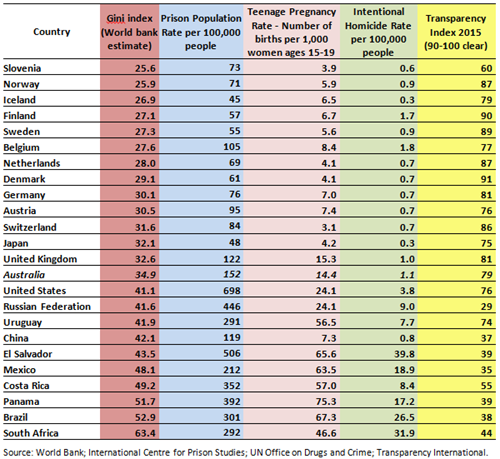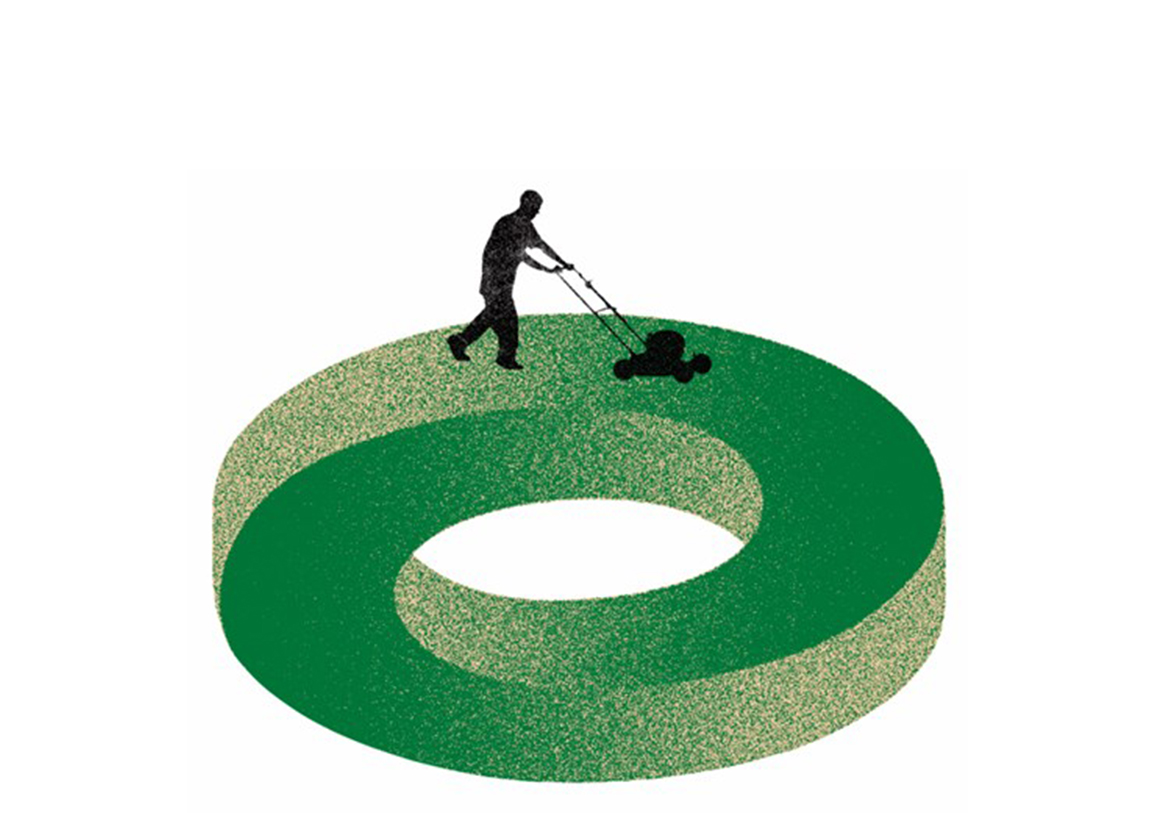At the Sydney Chain Reaction Foundation Breakfast Café, Kerr Neilson shared some important observations about the link between business development and economic prosperity on the one hand, and social cohesion and inclusion on the other.
The link between business development and economic prosperity on the one hand and social cohesion and inclusion on the other is an interesting subject of study, but it can be waffly. To try to bring some edge to it, I will try to stitch together some general observations that illustrate a commonality of factors that one might associate with a cohesive or inclusive society – a society one might classify as successful, and make the contrast with societies where these attributes are scarce.
Lets look at:
1. the Gini coefficient,
2. patterns of social behaviour during periods of inflation,
3. the selfish gene and the delight of self-interest, and
4. some of the effects of migration.
1. The Gini Coefficient (GC)
Let’s start with the Gini coefficient (also known as the Gini index), which is a measure of income distribution across a society on a scale of 0 to 100. If everyone had the same income, as one might imagine in some sort of utopia, the GC would be 0. However, we know that there are the weak and the strong, the cunning and the silly, and the World Bank would say that a GC of 30 or less tends to reflect a just and equitable society while a GC above 40 would represent severe income inequality.
Interestingly, when one ranks countries by their GC, the ranking approximately corresponds with what most of us might regard as “interesting” and relatively inclusive societies. When we look at the ranking tables, unsurprisingly, we find the liberal democracies of the Nordic region leading the field, with Norway, Finland and Sweden sitting between 25 and 30. Lower down the ranking come the rest of Western Europe at around 30 to 36 and from then on the clusters widen, with the likes of Russia at 42, and discouragingly, the US at 41. Latin American countries typically lie in the high 40s to early 50s and Africa brings up the rear, with the least equitable countries in the 50s and 60s.
It is difficult to pinpoint any causal relationship here. Is it that a thoroughly working representative government creates a more equitable society or is it the other way around, i.e. that an even-distribution of income creates or reinforces democratic representation?
Comparing countries by the Gini coefficient is helpful, but the more interesting observation is to look at income distribution in association with measures of social harmony. The table below presents some statistics relating to prison population, teenage pregnancy rates, the incidence of violent crime in the form of homicides and levels of perceived corruption.

Examining this table, one can see a link between strong representative government, income distribution and some measures of social harmony or fairness. There is no hard proof that a mal-distribution of wealth necessarily results in poor social harmony, but I think you would agree that improper representation of the “ruled” has a high correlation with dysfunctional societies.
In this regard, Australia is reasonably well placed.
2. Patterns of Social Behaviour during Periods of Inflation
There is a marvellous book, The Great Wave, in which the author, David Hackett Fischer, describes waves of price stability alternating with waves of inflation. While writing mainly about the patterns of prices, as an aside, he observes the pattern of social behaviour during periods of price stability in contrast with that during times of rising inflation. By calling on the records of the assizes, local police and the like going back over centuries, Mr Fischer compares social order and relative economic harmony. His endeavours start in the 14th century and he observes the cycles through time. Most interesting are the signs of social stress that appear during times of persistent rising inflation.
I do not believe that it is too much of a leap to suggest that protracted periods of inflation are associated, in the main, with governments trying to remedy earlier excesses, be it wars or grandiose programmes that exceeded the nation’s ability to live within its means. Putting up taxes is never popular and the most convenient solution is to debase money through coin chipping, in one form of another. Expediency over integrity seems to be the favoured choice of governments. The less representative the more prone a government appears to be to this type of behaviour. To meet its ambitions, governments tend to take short-term measures and in subsequent years this hurts the little person. The average citizen comes off second best.
It would also appear that informed, well-to-do citizens have through the ages been able to protect themselves quite nicely during periods of currency debasement. I have witnessed this debasement on a grand scale with Latin America’s hyper-inflation of the 1980s. At that time the small group of rich inhabitants were remarkably successful at hanging on to most of their wealth, and the same is true today in many African countries. What was most interesting is that as inflation subsided and the economy began to prosper, income distribution narrowed and the well-to-do found themselves no longer able to afford the bevy of servants that they had regarded as their birth right in the preceding inflationary decades.
In those periods of economic sloth and rising inflation there is strong evidence to show that crime rates rise in various forms – murder, other violent crimes, theft, alcohol consumption, and even children born out of wedlock.
Take just one example: the conviction rate for murder, manslaughter and serious assault between 1830 and 1900 in London, Chicago and Stockholm. Inflation was receding and with it, violent crime diminished from 12 to fewer than 4 per 100,000 in London, 5 to 2 per 100,000 in Stockholm, and 100 to 50 per 100,000 in Chicago.
Even booze consumption declined in the US from 7 gallons per adult (over 15 years of age) to 3 gallons from 1810 to 1890, a period of stable prices except during the period of the Civil War (1861-1865).
One could pick holes in these statistics, but from my reading across various countries, I strongly believe that there is a correlation, perhaps not causal, but a correlation between inflation, social inequality and discordant behaviour. Importantly, this is not confined to one nation, one period in a nation’s evolution, or its global status.
3. The Selfish Gene
Turning now to my third observation about factors affecting social cohesion, let’s think about the preservation of the species. Warren Buffet, a most successful investor, recommends all aspiring investors to read The Selfish Gene by Professor Richard Dawkins, to really understand how companies and markets function. At its core is a very simple proposition: “We are survival machines – robot vehicles blindly programmed to preserve the selfish molecules known as genes,” throw-away survival machines for the self-reproduction of information that it contains. The fate of that coded information is crucially bound up in the body in which it sits. If that body dies before reproducing, that information will not be passed on. Dawkins then qualifies, “Unfortunately, however much we may deplore something, it does not stop being true.”
The key argument here is that selfishness is inherent to our survival and indeed is the most potent force driving humanity. That in itself may not be interesting. What would be wonderful is if a society could be persuaded to acknowledge that by acting in a favourable way, all could benefit. This is the challenge that those with imagination should accept.
How can we convey the idea that by surrendering something, we paradoxically gain something, which we value even more? Or, as Dawkins put it, “Let us try to teach our children generosity and altruism, because we are born selfish. Let us understand what our own selfish genes are up to, because we may then at least have the chance to upset their designs, something that no other species has ever aspired to do.”
Is there any relevance of this to the Australia that we live in today? I think in general our score card is “satisfactory, but could do better!”
I think schools in this country do a great job at encouraging older students to nurture the younger children (so-called pastoral care). Institutions like Surf Life Saving with 170,000 voluntary members and 313 participating clubs,1 in my view, epitomises this notion of sacrificing yet receiving a compound reward. Here, we have citizens of all ages, genders, etc. voluntarily setting aside leisure time to promote group activities. It is a fantastic testament to the goodwill and generosity of individuals to play their part in opening the door for as many as possible to join in and to feel part of something substantial.
At the heart of the problem of inclusion is selfishness. This will not change, but with imagination, we can tackle it on a broader front. Those of us with the wherewithal can make grand gestures and those with less financial means can make a contribution by either surrendering time for others or simply showing more consideration and broad generosity of spirit, and to voice disapproval where unbridled selfishness is evident.
4. Diversity and Migration
At Platinum we have been fortunate to be able to create a reasonably successful business by enjoying this country's multicultural approach to migration. We have a hugely diverse group, to our collective benefit. For the record, among Platinum’s team of 80 plus employees, we have individuals from 24 countries and less than half of the total number were born in Australia; there are roughly as many males as females; and we have people from every sort of cultural background and all kinds of religious and political persuasion. Through this diversity, our clients are the winners and through that, the staff itself.
We have not been able to recruit as many women into our investment analyst team as we would have hoped. Interestingly, when we embark on our annual recruitment campaign, we will receive applications from some 1000 to 1200 applicants, but of those typically only 20% are female. Andrew Clifford and I find this disappointing, as again, from a self-interested perspective, we have found that women have tended to bring a different viewpoint to discussions which we lose in a male-heavy environment.
There have been plenty of studies that show the gains from cultural diversity and the benefits of migration. A recent study in Britain is a good example. The research, which was based on filings at Companies House, found that there are 456,073 immigrant entrepreneurs working in the UK, who have founded 464,527 businesses, and that one in seven businesses in the UK was started by migrants.2 Among small and medium-sized companies with a turnover of £1 million – £200 million, migrant entrepreneur-founded companies employ 1.2 million people, which represent 14% off all employment in this segment of the economy.
The study also reveals that immigrants are more likely to start a business than native Britons and are likely to do so at a younger age. 17% of non-UK nationals have started their own business, at an average age of 44, compared to only 10% of Britons who do so at the average age of 52. The top home-countries for foreign-born UK entrepreneurs are, interestingly:
1. Ireland
2. India
3. Germany
4. USA
5. China
6. Poland
7. France
8. Italy
9. Pakistan
10. Nigeria
Australia ranks 11th for the number of foreign-born entrepreneurs who have started businesses in the UK.
Indeed, it is well recorded how migrants have historically contributed both economically and culturally to nations. Think of London, which has experienced waves of new settlers from as early as Roman times and then through the centuries with the arrival of religiously persecuted people like the Huguenots and others, and these days, the street signs in East London are mainly in Hindi. Indeed, the great power of the day, the USA, owes its diversity and population density to waves of migration, and like here, one must acknowledge that it has been at a devastating cost to the original inhabitants. This, of course, circles back to the importance of ensuring that everyone has a “fair go” at being recognised and respected by society as a whole!
Returning to the Self Gene
Professor Dawkins makes the observation that “Any altruistic system is inherently unstable, because it is open to abuse by selfish individuals, ready to exploit it.”
We are presumably seeing this in the flesh in countries like Germany right now as the flight for survival has seen over 1 million migrants enter the country in the last 12 months. Influencing the humanitarian endeavours of Europeans is presumably the religious conviction of Judeo-Christian beliefs. The danger is that the overcrowding that results from this mass migration could then discredit the whole exercise and create a backlash.
Without venturing to cover this very important topic, I should point to the need to be fully aware of this danger of disenchantment and suggest that, like a family situation, there is a place for tough love. There is a need for the authorities to firmly require those who receive charity to take their reciprocal responsibilities as recipients of generosity.
I hope this meandering has given you some thread to follow in exalting and embracing diversity and inclusiveness, because, rather like “the invisible hand”, a term coined by Adam Smith in 1776, by thinking creatively about the scene around us, we can fulfil our own needs, and in so doing, also enrich society with a generous spirit.
Our individual actions can become the norm and, like sound theological philosophies, a society can soar on the wings of an idea. It is a fact that ideas can ignite a society and inflame a passion in a way that is transformational.
I don't believe many of you would like to live in gated communities, carry firearms, and constantly look over your shoulder, anxious about kidnapping, robbery or simply gratuitous violence.
Australia, is a wonderful society, but think what more it could be!
If it became a deeply etched belief that we can all help others by acting in an inclusive way, however small!
To close with Professor Dawkins:
“We, alone on earth, can rebel against the tyranny of the selfish replicators.”
DISCLAIMER: The above information is commentary only (i.e. our general thoughts). It is not intended to be, nor should it be construed as, investment advice. To the extent permitted by law, no liability is accepted for any loss or damage as a result of any reliance on this information. Before making any investment decision you need to consider (with your financial adviser) your particular investment needs, objectives and circumstances. The above material may not be reproduced, in whole or in part, without the prior written consent of Platinum Investment Management Limited.



